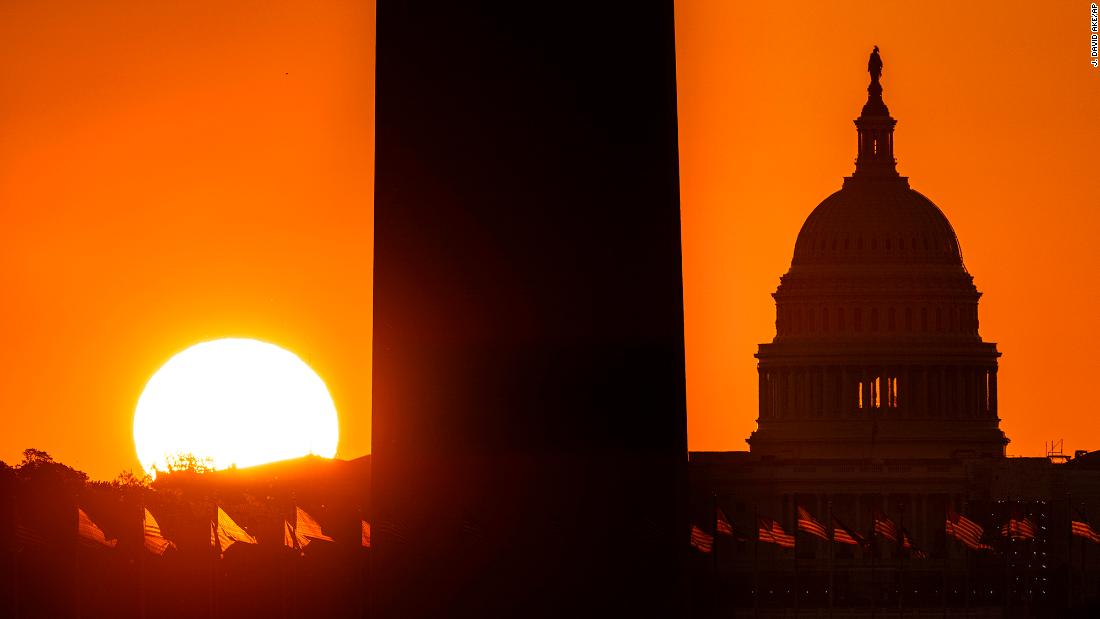Goldman Sachs warns that a US government shutdown is likely to occur in 2023 due to lawmakers' failure to agree on a budget, which could negatively impact stocks and economic growth.
Americans are growing increasingly anxious about the possibility of another government shutdown, with concerns about the impact on the economy and essential programs such as child care and fishing quotas.
### Summary
The impending government shutdown due to a funding dispute between hard-right lawmakers in the House and Democrats could affect various government functions and services, causing delays and closures in areas such as air travel, national parks, and food safety inspections.
The White House warns that a government shutdown at the end of the month could have damaging consequences for the economy, national security, and the American public.
The White House is preparing for a government shutdown that they believe the public will blame the GOP for, as Speaker Kevin McCarthy struggles to unify his party behind a spending bill, and economists suggest that a shutdown would benefit the Biden administration heading into the 2024 presidential election.
The US government faces a potential shutdown if Congress fails to agree on funding past September 30, which would be the first shutdown since December 2018 and could result in a longer standoff between parties.
Millions of federal employees and military personnel face the prospect of a government shutdown, which would result in financial hardships for American families, disruptions in services, and potential harm to the economy.
The White House is preparing federal agencies for a potential shutdown as House Republicans fail to come up with a plan to keep the government funded, risking disruptions to federal services and negatively impacting the U.S. economy.
The federal government is likely to face a shutdown that will affect various services, disrupt workers' pay, and create political turmoil as Republicans demand deep spending cuts.
The impending federal shutdown, combined with other economic challenges such as rising gas prices, student loan payments, and reduced pandemic savings, is expected to strain American households and potentially weaken economic growth in the last quarter of the year.
A potential government shutdown in Washington could have far-reaching consequences, causing financial losses for millions of people, disrupting medical research and food access, delaying regulatory efforts, and hampering the Biden administration's agenda on energy, climate, and infrastructure.
Rep. Tony Gonzales (R-Texas) predicts that the country is headed for a government shutdown and believes that a continuing resolution would only delay the problem rather than solving it.
Google searches about the potential government shutdown in the US are increasing, with a particular interest in how it would affect Social Security, veterans' benefits, and the US dollar.
A government shutdown in the US may cause the Federal Reserve to delay an interest rate hike and could impact the recent strength of the dollar, analysts have warned. The shutdown could also lead to a delay in key inflation data, which would affect Fed policy decisions, and may put pressure on consumer spending.
The federal government is on the verge of a shutdown, with potential consequences for various areas of governance.
The possibility of a government shutdown in the U.S. could have negative implications for the crypto industry's regulatory progress and projects, similar to the effects seen in the previous shutdown in 2018 and 2019, with delays in approvals and a withdrawal of a bitcoin ETF application.
The U.S. is on the verge of a government shutdown as Congress debates spending levels and aid to Ukraine, which could potentially affect government operations and federal workers' paychecks.
A government shutdown is looming, and if lawmakers fail to pass a budget or stopgap measure by September 30, federal agencies deemed non-essential will cease operations, impacting federal workers, government benefits recipients, air travel, and the overall economy.
The Federal Aviation Administration (FAA) faces the possibility of a double government shutdown as the deadline to renew its authorizing law coincides with the deadline to extend federal funding, which would result in disruptions to air traffic control training, technology upgrades, and the loss of millions of dollars in daily revenue.
A government shutdown would severely impact the U.S. Securities and Exchange Commission's ability to approve IPOs and respond to market turmoil, according to its chair, Gary Gensler.
The possibility of a US government shutdown is causing uncertainty in the market, though investors believe it is unlikely to cause significant damage to stocks; however, the delay in economic reports could impact investor sentiment and contribute to market volatility.
Federal agencies are warning their workers of a possible government shutdown, where employees may not receive pay, if Congress fails to reach a funding deal by the end of September 30th.
The White House has warned that the partial shutdown of the US government could hinder almost 2,000 long-term disaster recovery projects, impacting communities across the country.
Congress is facing a potential government shutdown as the Republican-led House and Democratic-controlled Senate struggle to reach a short-term funding agreement before the looming deadline.
The deadline for the government shutdown is approaching quickly, but things are becoming more complicated at the Capitol as disagreements over Ukraine funding and border security provisions hinder progress on a compromise spending plan in the Senate.
A government shutdown is looming as lawmakers have until the end of the day Saturday to reach a deal or the U.S. will face one of the largest government shutdowns in history, impacting millions of workers and services.
The U.S. government is on track to shut down at 12:01 a.m. on October 1 unless lawmakers pass a continuing resolution or federal budget by September 30, and the biggest obstacle to reaching an agreement lies with a small group of House conservatives who are demanding deep spending cuts that won't pass the Democratic-controlled Senate.
The US government narrowly avoided a shutdown after Congress passed a last-minute funding bill and President Joe Biden signed it just before midnight, preventing an unnecessary crisis and ensuring the government remains open until at least November 17.
